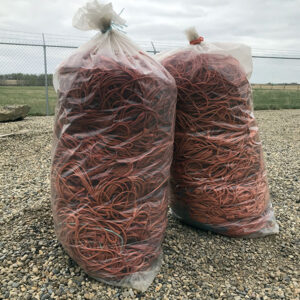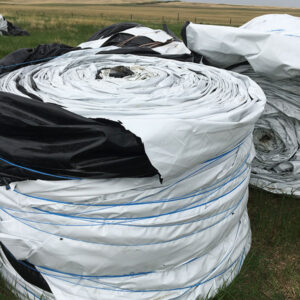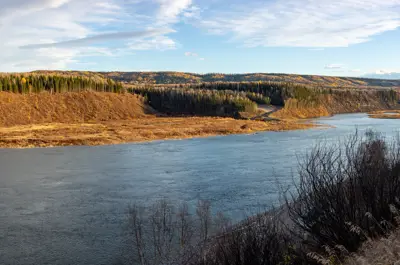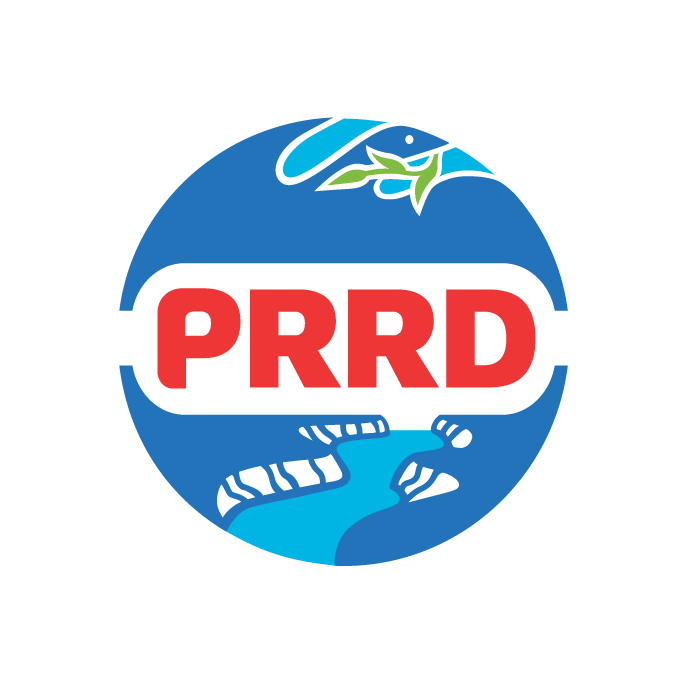- Shake out the twine removing as much debris, mud, snow and ice as possible
- Use a Cleanfarms collection bag, which are provided for free at participating sites
- Place twine loose in a bag
- Secure and close a full bag with twine or a zip-tie
- Return bags and materials to your local collection site
- Take another bag home with you
Recycling
The Peace River Regional District offers depot recycling services through Recycle-It Resource Recovery and Recycle BC to the region. You can drop off recyclable materials for free at a recycling depot. If your community does not have separated curbside glass collection, please return all flexible plastics, foam packaging like styrofoam and non-deposit glass to a depot for recycling. To learn what you can bring to your local landfill, recycling depot or waste transfer station, use our recycling app, pRRRdy Says.
Recycling Depots
If you are a resident, you can drop off materials for free at a recycling depot:
Please rinse your containers and soft plastics before recycling.
pRRRDy Says App
pRRRDy Says is your simple and reliable app for learning what you can bring to your local landfill, recycling depot or waste transfer station. Find out how to properly recycle, compost or dispose of waste materials in your community.
Accepted Materials
If you do not see the material you are looking for, visit Recycle BC to see all accepted and non-accepted materials.
Grain Bags and Twine
You can apply online to access a grain bag roller. They are available for rent at a cost of $50 per day. You can email us for more information or call 250-784-3200. The following landfills and waste transfer stations collect secured grain bags:
- Bessborough Landfill
- Buick Creek Transfer Station
- Cecil Lake Transfer Station
- Chetwynd Landfill
- North Peace Regional Landfill
- Prespatou Transfer Station
- Rolla Transfer Station
- Tomslake Transfer Station


Get Ready to Recycle your Used Grain Bags and Plastic Baler Twine
Pick up a collection bag from a participating collection site then follow these steps to ensure that your material can be collected and recycled.
When grain bag recycling, make sure to:
- Shake out the bag and remove as much debris as possible
- Prepare grain bags by rolling tightly, keeping them as clean as possible and tying with twine as we may reject excessively dirty or loose or unrolled bags
- Return your well-rolled plastic bail to a collection site
Frequently Asked Questions
Check out our frequently asked questions about recycling. If you can not find the answer you are looking for, you can email Environmental Services for more information.
All material from the PRRD is shipped out via backhaul, filling up trucks that would be heading south empty otherwise. Click through the slideshow below to learn more!
Information provided by Recycle-It Resource Recovery based on materials they process on behalf of the PRRD.
Recycle BC is a non-profit organization that uses fees paid by organizations to finance residential recycling programs in many areas across BC. These organizations include retailers and manufacturers that supply packaging and printed paper to BC residents. They are responsible for collecting and recycling these materials once residents are finished with them. This is called Extended Producer Responsibility, or EPR. These programs are offered directly or collaboratively with local governments, First Nations, private companies and other non-profit organizations.
Through these programs the manufacturers and retailers of items such as beverage containers, electronics, paint, used oil, tires and batteries are responsible for end-of-life management. EPR is a way for businesses to manage the environmental impact of products during each stage of the products lifecycle, from selecting the materials used in production through to collection and recycling of the product when it is no longer useful.
How is household recycling collected at the transfer stations and sites?
It varies depending where you recycle.
Rural Transfer Stations
Household recycling collected through the Recycle BC program is hauled two different ways. For the big 50 and 40 yard bins are hauled by the transfer station contractor. Third party contractors managed by Recycle BC haul the mega bags.
Recycling Depots
Recycling is collected in various totes. The recycling contractor collects that materials from the bins and empties them into a truck with three compartments. The front compartment is where the glass is deposited. The second compartment is where the hard plastic and tin are deposited. Any loosely collected plastic film is placed in large bags. These large bags make it easy to separate from the hard plastic once the material is deposited on the floor at the recycle centre. The last compartment is where the paper goes. Third-party contractors collect cardboard from the cardboard bins.
What are the different streams of recycling?
Depending where you recycle there are different items and materials that can be recycled. There are two different recycling programs operated in the RD. At the Rural Transfer Stations, household printed paper and packaging material are collected, processed and marketed by Recycle BC for recycling. If you recycle in town by curbside or depot or use one of the unattended recycling depots, that material is collected, processed, and marketed by the Regional District Recycling Contractor.
Who gets the money for the recycling collected at the rural transfer stations?
The rural transfer stations operate the Recycle BC recycling program, a provincial stewardship program. The Peace River Regional District receives the revenue that is generated from the recycling collected. In 2017, the PRRD received $3,634.92 in revenue from Recycle BC material.
Who gets the money for recycling at the landfills?
At the landfills there is no revenue received for tires that are collected; however, Tire Stewardship will pick up and haul away the tires for free to where they are recycled. Wood waste becomes cover material and to help construct roads. Metal waste and the revenue gained goes to the contractor as part of their operating contract. Cardboard and household recycling collected by the PRRD’s recycling contractor is processed and marketed through that contract. A part of the contract revenue from that material is given back to the PRRD.
The act of recycling costs money. There are costs to collect, transfer, haul and process material so that in can be used in new products. Even with the cost, recycling is better for the environment because it maximizes the use of resources that have already been extracted from the Earth.
If recycling has value, why doesn’t the value cover the cost of service?
The revenue paid for recycling fluctuates constantly depending on markets. This is because recycling is a commodity like many other things.

Contact Us
Environmental Services
1981 Alaska Avenue,
Dawson Creek, BC
V1G 4H8





